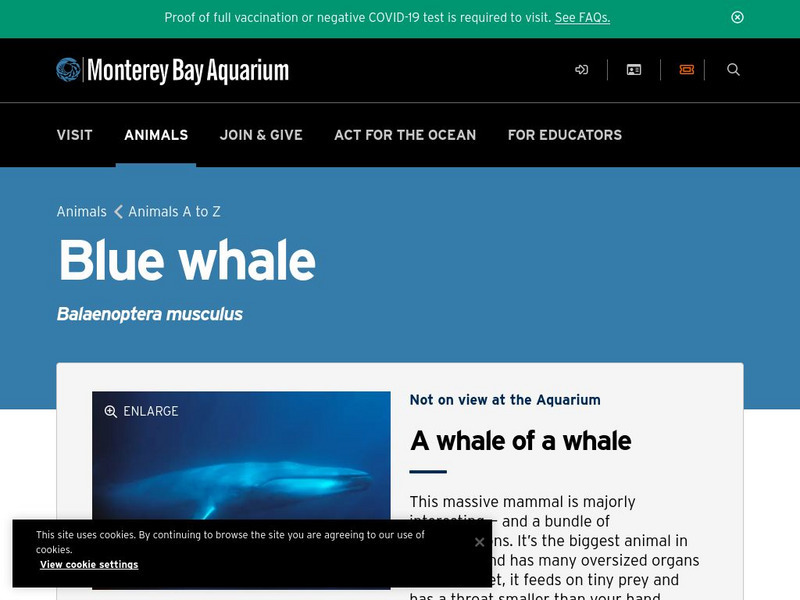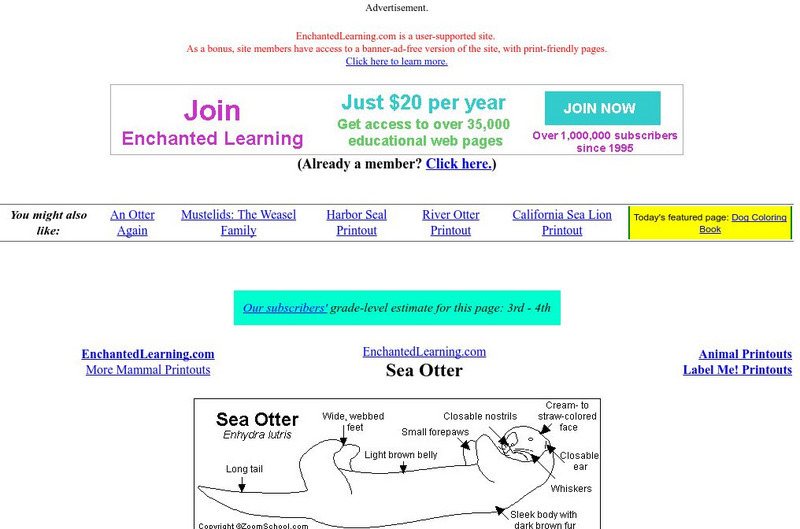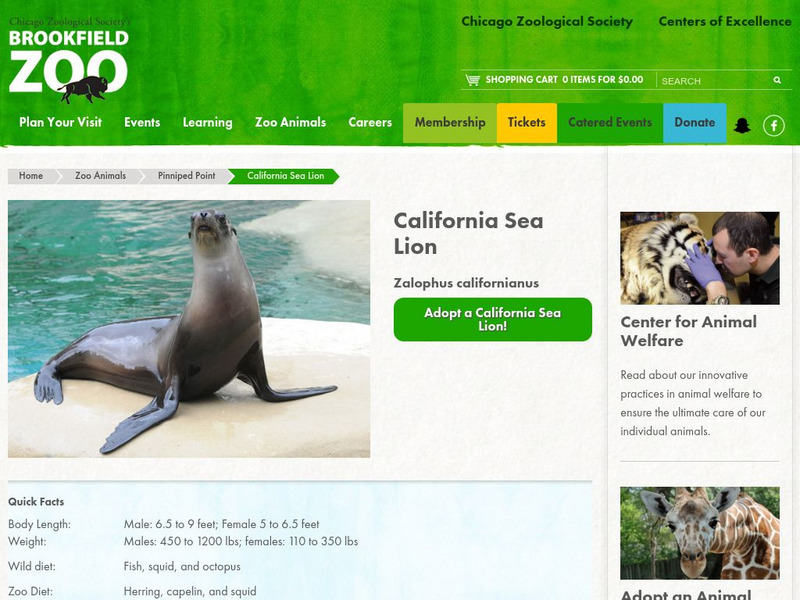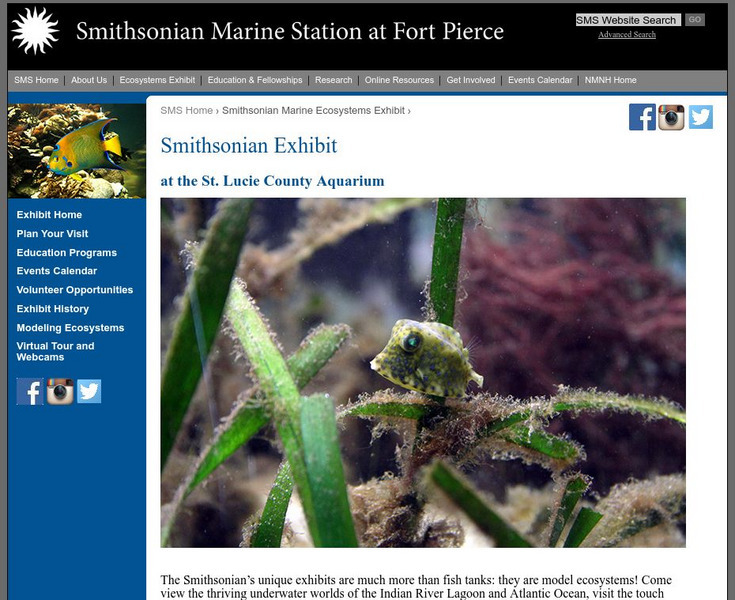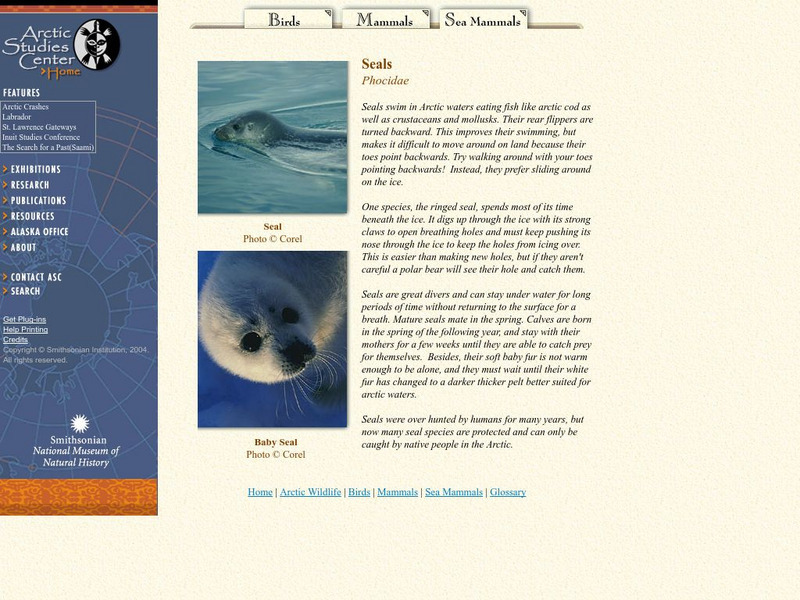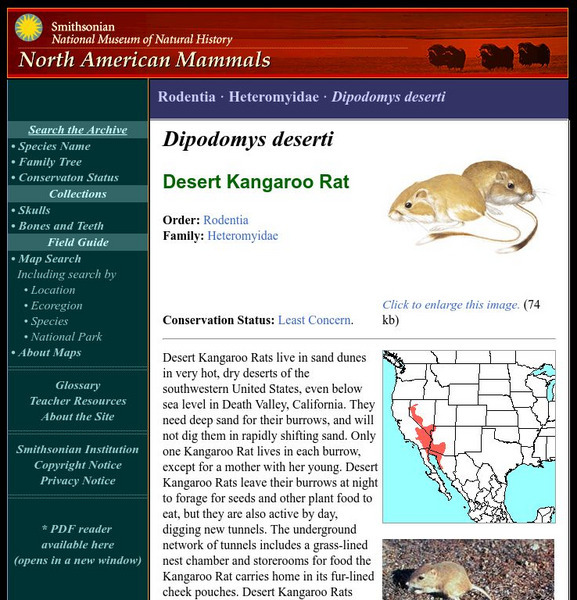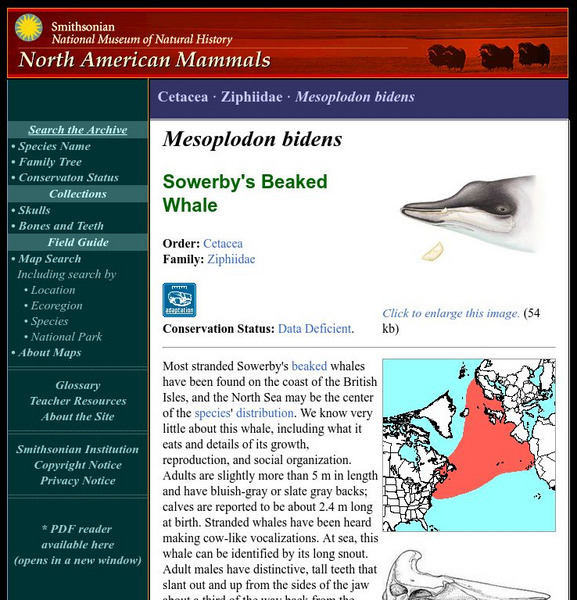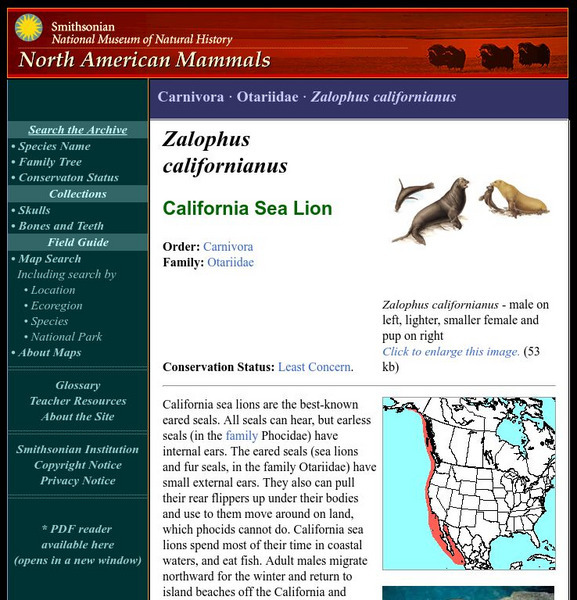Hi, what do you want to do?
Monterey Bay Aquarium
Monterey Bay Aquarium: Blue Whale (Balenoptera Musculus)
Resource that gives information on the diet, range, relatives of the blue whale. Conservation notes and cool facts are also included. There are links to similar information on dozens of other types of marine life.
Sea World Parks & Entertainment
Sea World: Polar Bears
Outlines the characteristics of the polar bear, including classification, habitat, behaviors, and conservation. Helps students identify with polar bears with a list of "Books for Young Readers." Information at a level of upper...
Enchanted Learning
Enchanted Learning: Sea Otter
Here you can find a great printout of a sea otter as well as detailed information about the animal. Learn what a sea otter looks like, what kind of fur they have, what they eat, and who their predators are.
Saint Louis Zoo
Saint Louis Zoo: California Sea Lion
Discover fun facts and learn about the habitat, range, appearance, diet, and conservation status of the California sea lion.
Chicago Zoological Society
Chicago Zoological Society: Zoo Explorer: California Sea Lion
Get acquainted with the California sea lion while browsing this animal guide from the Brookfield Zoo. Subject matter includes quick facts, a photo, and highlights on the appearance, habit, and other unique characteristics of this marine...
Sea World Parks & Entertainment
Sea World: Animal Bytes: African Hedgehog
Brief, but concise resource contains helpful information on this little creature. Provides scientific classification of the African hedgehog, fast facts, fun facts as well as additional information on ecology and conservation.
Other
Ocean Oasis: Field Guide
Ocean Oasis is a giant-screen film that depicts Mexico's Sea of Cortes and the Baja California desert. This companion site features much of the information the film has, such as beautiful images of animals, water, and land that have...
Smithsonian Institution
Smithsonian Marine Ecosystems Exhibit
Take an online tour of the Smithsonian's "Exploring Marine Ecosystems" exhibit. Learn about coral reefs and look behind the scenes as scientists maintain the model ecosystems.
Smithsonian Institution
National Museum of Natural History: American Mammals: Sea Otter
The Sea Otter is the largest member of family Mustelidae, and the smallest marine mammal. Sea Otters are more aquatic even than seals and sea lions, because they mate and give birth in the water. Learn more about the Enhydra lutris, more...
BBC
Bbc Nature: Walruses, Seals and Sea Lions
Dive in amongst the pinnipeds - the seals, walrus and sea lions - for a taste of what life is like for fin-footed, semi-aquatic mammals. Flat flippers help give these typically rotund, barrel-shaped animals an unlikely grace and beauty...
US Navy
Office of Naval Reasearch: California Sea Lion
This very thorough site examines the characteristics, adaptations, status and threats, and current research associated with the California Sea Lion. Enjoy the pictures as read about this interesting mammal.
Smithsonian Institution
National Museum of Natural History: Arctic Studies Center Mammals Seals
This Smithsonian website has a brief, but thorough, article on the Seal that also includes pictures.
Smithsonian Institution
National Museum of Natural History: American Mammals: Desert Kangaroo Rat
Desert Kangaroo Rats live in sand dunes in very hot, dry deserts of the southwestern United States, even below sea level in Death Valley, California. They need deep sand for their burrows, and will not dig them in rapidly shifting sand....
Smithsonian Institution
National Museum of Natural History: American Mammals: Sowerby's Beaked Whale
Most stranded Sowerby's beaked whales have been found on the coast of the British Isles, and the North Sea may be the center of the species' distribution. We know very little about this whale, including what it eats and details of its...
Smithsonian Institution
National Museum of Natural History: American Mammals: Stejneger's Beaked Whale
Thirty-one of the 48 sightings of Stejneger's beaked whale have come from Alaskan waters. It is suspected this species favors deep waters, including the Aleutian Trench and the Aleutian Basin, which is some 3,500 m deep, rather than the...
Smithsonian Institution
National Museum of Natural History: American Mammals: Insular Vole
There have been only scattered observations of the Insular Vole since 1885 because the two islands in the Bering Sea off the coast of Alaska where it lives are rather inaccessible. The Voles live in burrows dug in moist lowland areas, at...
PBS
Pbs Nature: Otters
Discover more about how otters live, what they eat and how they socialize when you visit this informative resource. This condensed site will benefit students who need help narrowing their research information.
Denver Zoo
Denver Zoo: Asian Elephant
The Denver Zoo features a comprehensive overview of the California sea lion focusing on its habitat, range, adaptations, diet, physical characteristics, and more.
Smithsonian Institution
National Museum of Natural History: American Mammals: Steller Sea Lion
Steller sea lions are divided into two groups for conservation purposes. Those that live around Alaska and Russia are classified as endangered. Learn more about the Eumetopias jubatus, more commonly known as a Steller Sea Lion, in this...
Smithsonian Institution
National Museum of Natural History: American Mammals: California Sea Lion
California sea lions are the best-known eared seals. All seals can hear, but earless seals (in the family Phocidae) have internal ears. Learn more about the Zalophus californianus, more commonly known as a California Sea Lion, in this...
Sheppard Software
Sheppard Software: Otters
This site gives an in-depth description of a otter, including its behavior, appearance, reproduction, and classification. The site includes photos and illustrations and an interactive quiz to test your understanding.
Curated OER
Baby Seal on the Sea Ice
A very short description of this solitary predator with a revealing picture that brings home the ferocity of this mammal.
Smithsonian Institution
National Museum of Natural History: American Mammals: Beach Vole
Found only on Muskeget Island, the Beach Vole became isolated from its closest relative, the Meadow Vole, about 3,000 years ago during a glacial melt and rise in sea level. It is the only mammal endemic to Massachusetts, the result of...





